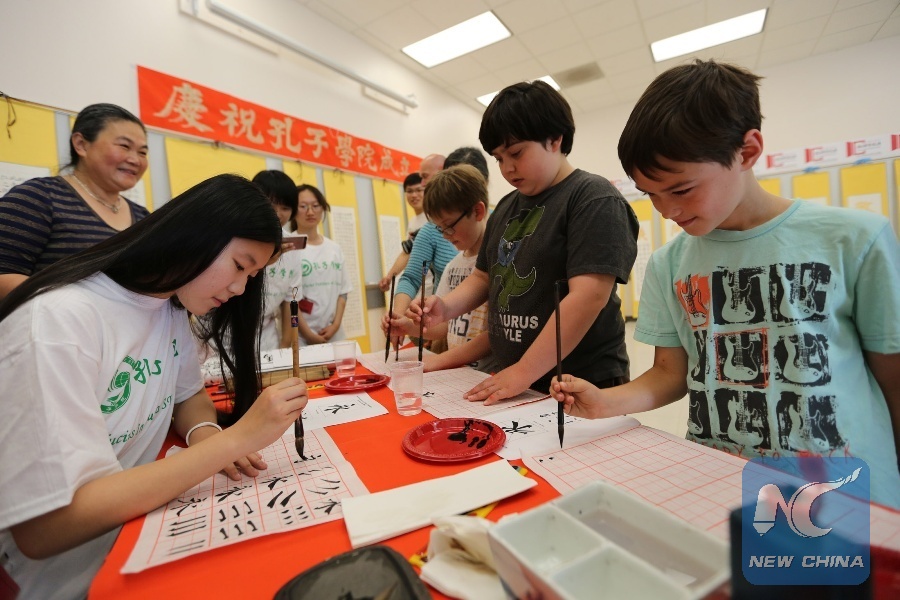Washington on Thursday designated the center that manages China's Confucius Institutes in the country as a "foreign mission," the latest sign of deteriorating relations between the two countries.
In a statement, U.S. Secretary of State Mike Pompeo labeled the Confucius Institute U.S. Center (CIUS Center) "an entity advancing Beijing's global propaganda and malign influence campaign on U.S. campuses and K-12 classrooms."

American students are practising Chinese calligraphy at the Confucius Institute in San Francisco, U.S., September 27, 2014. /Xinhua
The Confucius Institutes, created in 2004 in the U.S., aim to promote Chinese language and culture at schools and universities around the world. According to official figures, there are 110 Confucius Institutes and over 500 Confucius Classrooms across the United States.
But the centers have now been stigmatized by the Trump administration for promoting views of the Communist Party of China.
In a 2019 report, U.S. Senate investigators accused the Confucius Institutes of acting as Chinese government propaganda arms and urged the government to shut them down.
Both the institutes and Chinese government denied these allegations.
China's foreign ministry described the report as a "baseless accusation," saying "politicization" of Confucius Institutes is out of "a typical Cold-War mindset."
The institutes are set up jointly with local schools in the U.S. in the principle of mutual respect, friendly consultation, equality and mutual benefits, and the daily operation and management of these institutes are legal, legitimate, open and transparent, the ministry said.
The Confucius Institutes have played a role in promoting people-to-people and cultural exchanges, and they reflect the need of American people to learn Chinese language and culture, it said.
The two major economies are at odds over issues ranging from the handling of coronavirus pandemic to Hong Kong's national security law and the Trump administration's "espionage" charges against China's Consulate General in Houston.
In June, the U.S. State Department announced it would start treating four more Chinese media outlets as "foreign embassies," following a decision in February to designate five Chinese media outlets as "operatives of the Communist Part of China."
Beijing has admitted that the relations between the two countries are at their lowest since 1979.
In a recent interview, Chinese State Councilor and Foreign Minister Wang Yi said China-U.S. relations face the "gravest" challenge since the establishment of building diplomatic ties, and their exchanges and cooperation in many areas have been "seriously disrupted."
Wang said the root cause is some American politicians are using their power to smear China with fabrications. They want to "revive McCarthyism" and attempt to undermine the relationship and stoke hostility and eventually to drag the two countries into conflict and confrontation, he added.
Wang also stressed on dialogue and mechanism to manage differences. "All issues can be put on the table for discussion."
The foreign minister also proposed the two sides to draw up three lists, namely cooperation, dialogue and issues, as part of the efforts to manage bilateral ties.
"Our message is quite clear: We urge the U.S. to stop acting with arrogance and prejudice, but enter into constructive dialogue with us on an equal footing."


